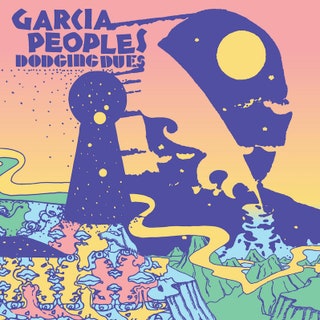The New Jersey sextet’s fifth studio album is an easeful tour of muscular riff-rock, noodly song suites, and curtsying pastoral folk.
Since debuting in 2017, Garcia Peoples’ greatest challenge has been to get people to forget what they’re called. You don’t name your psychedelic rock band after the most famous member of the most famous psychedelic rock band of all time if you’re not up for the challenge. And while their particular trip has often taken them through the Grateful Dead’s astral wake, they’ve steadily widened their sound and ambition over the past five years to include touches of dub, sticky Bitches Brew jazz, and tetchy post-punk. They’re too nervy to be a proper jam band, but they jam way too much to be anything else. Dodging Dues, the New Jersey sextet’s fifth studio album, dials back some of the abrasion of 2020’s Nightcap at Wits’ End, but its easeful tour of muscular riff-rock, noodly song suites, and curtsying pastoral folk settles further into a sound worth taking on its own merits. If you pick up this record in the hopes of hearing someone imitate the tone of Jerry Garcia’s tiger guitar, look elsewhere.
Dodging Dues was recorded in a pair of sessions in 2020, with Superwolves maestro Matt Sweeney in the producer’s chair. Though it’s relatively tidy at 34 minutes long, its sense of patience and control makes its runtime seem broader, if not longer; where most rock groups’ studio improvisations feel unnaturally compressed by the band’s consciousness of an album’s shape and size, Garcia Peoples never sound burdened by much of anything here. Their general ease and comfortability, aided by the clarity of Sweeney’s production, give these seven songs a sense of fluid communication as they move through styles; even if the details dim in the memory, the feeling of their conversation is easy to internalize.
Dodging Dues is built around the trio of “Cold Dice,” “Tough Freaks,” and “Stray Cats,” a musically interlocking triptych of songs whose lyrics circle the exhaustions of big-city life in search of a place to catch a breath. Danny Arakaki, Tom Malach, and Derek Spaldo’s guitars pass one another like pedestrians in a busy crosswalk, become entangled, split back apart, and pursue oblong paths that don’t appear to follow logic, but they never stumble into dissonance. “Sick of dodging dues,” they sing in “Tough Freaks,” “stop wasting all your time.” This is ordered, well-managed music about the importance of living an ordered, well-managed life. “Heal me with truth, you immaculate one,” goes one line in “Cassandra,” a song so mannered and traditional in its expectations you expect it to doff its cap as you pass.
It’s Garcia Peoples playing to their strengths. Though still firmly tape-trader music, their form of psychedelia has more in common with the likes of Kikagaku Moyo, Dungen, and Chris Forsyth, the latter of whom they’ve backed live—all artists who use the clicked-in propulsion of krautrock to keep their wildest trips firmly within the guardrails. For Garcia Peoples, this sense of restraint makes their music more compelling and allows them to subvert expectations. At just the moment you’d expect closer “Fill Your Cup”’s middle solo to lift off into some triumphant shredding, it suddenly goes stroboscopic and buries itself in the belly of the song. Where most bands would draw out a shining, imperial solo to cap something like the aforementioned three-song run, on “Stray Cats” Garcia Peoples give you 10 needling seconds of mosquito buzz, then peace out.
This dedication to a form of efficient and orderly journeying—musically or otherwise—carries through much of the album. In “Here We Are,” the guitars go balletic, interweaving, touching down, springing back up. They’re not quite interlocking or running parallel or phasing; Sweeney places them just close enough to force you to consider the blank space their dancing creates. Listening to it is like tracing the gaps in a healthy monstera.
Even when things get loud, they don’t get heavy. Opener “False Company,” a beefy valediction to a fake friend, pumps by on an oil derrick beat from drummer Cesar Arakaki and bassist Andy Cush (who is also a contributing editor at Pitchfork), while the guitars smoke a low and slow barbecue riff. It’s an almost absurdly muscular song, the kind of thing you can imagine slapping the hood of while cracking a cold beer, but the vibe is pure light: “Now that the weight has been lifted,” Pat Gubler sings, “There’s a gladness in my heart that’s returning to me.”
You can hear a touch of Thin Lizzy in “False Company,” and a whole lot of ZZ Top. There’s Fairport Convention in “Cassandra,” and, yeah, the Grateful Dead pretty much everywhere else. Dodging Dues isn’t interested in clearing new territory for psychedelic rock, which is not a criticism: Wandering a well-tended garden path can be far more rewarding than hacking your way through the brush. Lyrically and musically, this album is built to pursue the felicity of spirit that can come with following an expertly manicured path, which is another way of saying it goes where it wants without worrying about the weight of other peoples’ expectations. You can travel so much farther when you pack light.





%20Music%20Album%20Reviews.webp)










0 comments:
Post a Comment